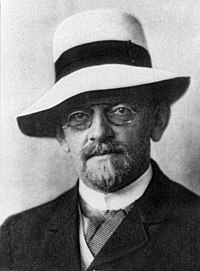Hilbert's problems

Hilbert's problems are a set of 23 math problems that were proposed by mathematician David Hilbert in the year 1900. He presented these problems at a conference in Paris and challenged mathematicians to solve them.
Now, let's imagine you are playing a game where you need to solve some tricky math puzzles. Hilbert's problems are like the highest level of difficulty puzzles in that game.
These problems were based on different areas of mathematics such as algebra, geometry, number theory, and analysis. They were considered to be the most challenging math problems of that time that could lead to the development of new techniques, theories, and concepts in mathematics.
For instance, one of the problems (known as the Riemann Hypothesis) was related to prime numbers, which are numbers that can only be divided by 1 and themselves. The question posed by this problem was whether there was a pattern to how prime numbers are distributed.
Another problem (known as the Continuum Hypothesis) was related to the size of infinity. It asked whether there existed a set that was larger than the set of all natural numbers (1, 2, 3, etc.) but smaller than the set of all real numbers (numbers with decimals).
These problems challenged mathematicians' skills in logic, reasoning, and problem-solving. And even today, over a hundred years later, many of these problems remain unsolved, with great rewards awaiting those who manage to unravel them.
Now, let's imagine you are playing a game where you need to solve some tricky math puzzles. Hilbert's problems are like the highest level of difficulty puzzles in that game.
These problems were based on different areas of mathematics such as algebra, geometry, number theory, and analysis. They were considered to be the most challenging math problems of that time that could lead to the development of new techniques, theories, and concepts in mathematics.
For instance, one of the problems (known as the Riemann Hypothesis) was related to prime numbers, which are numbers that can only be divided by 1 and themselves. The question posed by this problem was whether there was a pattern to how prime numbers are distributed.
Another problem (known as the Continuum Hypothesis) was related to the size of infinity. It asked whether there existed a set that was larger than the set of all natural numbers (1, 2, 3, etc.) but smaller than the set of all real numbers (numbers with decimals).
These problems challenged mathematicians' skills in logic, reasoning, and problem-solving. And even today, over a hundred years later, many of these problems remain unsolved, with great rewards awaiting those who manage to unravel them.
Related topics others have asked about:
